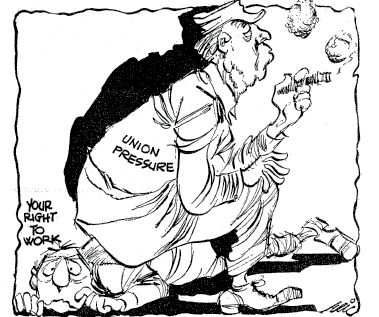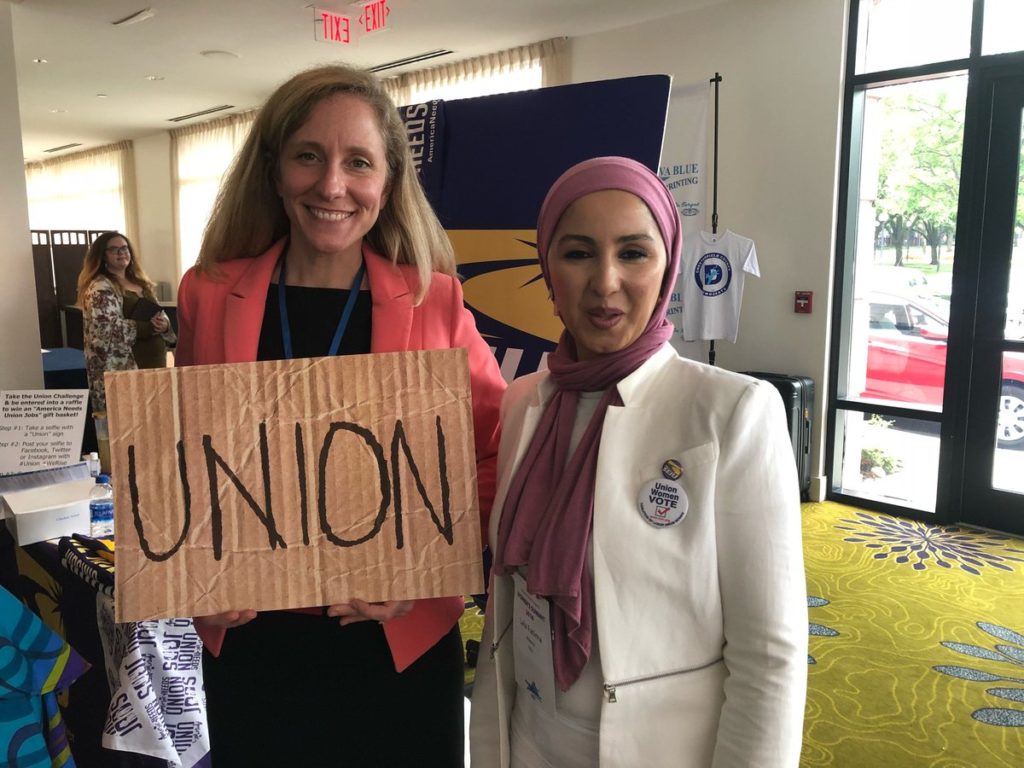Is This Any Way to Run a City’s Schools?
Leaked CTU Proposals Won’t Do Anything to Improve Schools’ Poor Performance

For more than 70 years, Virginia’s Right to Work law has prohibited union bosses from wielding their federal government-granted monopoly privileges to get employees fired for refusal to pay union dues or fees.
Big Labor allies in Richmond have periodically tried over the years to ram through schemes gutting Right to Work protections for employees.
In 1991, for example, 10 Virginia state senators sponsored a bill that would have forced union nonmembers to pay so-called “agency” fees to Big Labor as a condition of employment.
But over the course of the quarter century that followed, the Old Dominion Right to Work statute appeared increasingly to be safe.
‘Employees Who Refuse to Hand Over Their Hard-Earned Money Will Be Fired’
Not anymore. On December 28, 2018, radical socialist freshman Del. Lee Carter (D-Manassas) introduced H.B.1806, legislation that would repeal the Right to Work provision that has been in the Code of Virginia since 1947 and add a provision that explicitly authorizes compulsory union fees.
While H.B.1806 did not come up for a vote this year, Mr. Carter is sure to sponsor a Right to Work destruction measure again if he is reelected.
And an alarmingly high number of union-label lawmakers are so far refusing to let constituents know how they will vote on the forced-fee scheme when it comes to the floor.
National Right to Work Committee President Mark Mix explained:
“No one should be fooled. If legislation like H.B.1806 is adopted by the Virginia General Assembly, employees across the Old Dominion will be compelled to pay Big Labor bosses just to get or keep a job.
“Employees who refuse to hand over their hard-earned money will be fired — plain and simple.”
Mr. Mix added that the injustice of the forced union financial support that is authorized and promoted by federal labor policy is magnified when the victimized workers are actually getting paid less as a consequence of being under union monopoly control.
Monopolistic Unionism ‘Reduc[es] Pay of the Most Productive Workers’
Among the types of workers whose paychecks are often smaller because they are subject to union “exclusivity” are those who are especially talented and/or hardworking. In fact, over the years, a number of academic apologists for Organized Labor have made no bones about the fact that workers whose productivity is above average typically get paid less when they are unionized.
Take, for example, Richard Rothstein, now a distinguished fellow with the relentlessly pro-Big Labor Economic Policy Institute.
In a brief survey of union-friendly academic literature on the impact of “exclusive” union bargaining on the pay of employees with diverse levels of skill and industriousness, Mr. Rothstein has written:
“In [unionized] firms, wages of lower paid workers are raised above the market rate, with the increase offset . . . [in part] by reducing pay of the most productive workers. If firms with this practice are rare, competitors will be able to bid away their best workers.”

Many Candidates Apparently Hope Pro-Right to Work Citizens Aren’t Paying Attention
Recognizing that Virginians’ Right to Work could be in grave peril in 2020, depending on the outcome of this fall’s elections, the National Right to Work Committee has launched a grassroots campaign to convince legislative candidates in key districts to pledge to oppose forced unionism before Election Day.
The Old Dominion is one of a handful of states in which state legislative elections regularly occur in odd-numbered years like 2019.
This year, all 40 seats in the Virginia Senate and all 100 seats in the Virginia House of Delegates are potentially up for grabs.
In the summer, the Committee, which is based in northern Virginia, began contacting major-party legislative candidates as their names and addresses became publicly available, urging them to complete and return a candidate survey.
The survey specifically asks candidates to “oppose all efforts to weaken or repeal Virginia’s Right to Work law,” as well as other bids to grant new monopoly privileges to Big Labor.
“Unfortunately,” said Mr. Mix, “a large share of the candidates the Committee was able to survey before this Newsletter edition went to press in early August did not respond at the time.
“Committee officers suspect that most of the candidates who are concealing their stance on Right to Work actually support forced unionism but hope freedom-loving citizens won’t hold them accountable now for siding with Big Labor bosses as long as they don’t trumpet their opposition to voluntarism.”
Pressure on Nonresponsive Candidates Will Keep Mounting Until Election Day
The Committee is determined to prevent Virginia candidates from getting away this year with concealing their positions on Right to Work and forced unionism, Mr. Mix emphasized.
This month, the Committee will repeatedly mail identified Right to Work supporters in roughly 30 Virginia House districts and roughly 10 Senate districts, mobilizing them to contact their candidates regarding their refusal to answer their surveys and/or their open advocacy of compulsory unionism.
The Committee will continue mailing tens of thousands of its members and supporters in targeted legislative districts throughout October, urging them again and again to contact fence-sitting and unabashedly hostile candidates, in a persistent effort to turn them around.
“Thanks to the Committee’s state survey program,” said Mr. Mix, “candidates who are either covertly or overtly backing the union hierarchy’s scheme to destroy Virginia’s Right to Work law will have a clear choice as Election Day approaches.
“They can pledge to reverse course and support Right to Work in the future or face the potential political fallout.”
While protecting employees’ personal freedom is the direct and primary purpose of Virginia’s Right to Work law and the 26 other such state laws currently on the books, they also have an evident economic impact.
As an example, Mr. Mix pointed to the U.S. Commerce Department’s statistics regarding annual output in automotive manufacturing, as measured in constant, chained 2012 dollars.
Workers Would Miss Out On Good Job Opportunities
“Real automotive manufacturing output in the 22 states that already had Right to Work laws in 2007 grew by 38% over the next decade,” said Mr. Mix.
“But it fell by 22% in the 23 states that were still forced-unionism as of the end of 2017.
“Once you’ve looked at these data, it’s hard to believe Volvo’s largest truck manufacturing facility in the world would be located in western Virginia’s Pulaski County were it not for the state’s Right to Work law.
“This facility already supports more than 3,200 jobs, and this summer the Volvo Group announced it would invest nearly $400 million to expand its operation in Pulaski County.
“Thanks to the expansion, the plant is expected to create an additional 777 jobs by 2025.
“Volvo decided to expand in Virginia rather than in several other states it was reportedly considering despite the fact that the financial incentives offered by the state were quite modest by comparison with what state politicians are often willing, nowadays, to put on the table to lure a major investment.”
Why Attack the Right to Work in the Old Dominion?
Since the Right to Work law clearly benefits Virginia’s economy and ordinary citizens continue overwhelmingly to support it, one may wonder why the former bipartisan consensus in favor of retaining it has evaporated over the past few years.
The dismaying answer, suggested Mr. Mix, is political calculation.
“There is no doubt that a rising share of elected officials in Virginia are dependent on the Big Labor machine to get in power and stay in power,” he said.
“This includes federal politicians such as freshman U.S. Rep. Abigail Spanberger [D]. She represents a staunchly pro-Right to Work district, but is currently cosponsoring H.R.2474, radical legislation that would gut all state Right to Work laws and authorize forced union fees nationwide.
“Ms. Spanberger and many of her counterparts in Richmond seem to think opposing Virginia’s cherished Right to Work law is a smart political strategy. On Election Day 2019, we’ll begin to find out how that works out for them.”
If you have questions about whether union officials are violating your rights, contact the Foundation for free help. To take action by supporting The National Right to Work Committee and fueling the fight against Forced Unionism, click here to donate now.

Leaked CTU Proposals Won’t Do Anything to Improve Schools’ Poor Performance

Wherever Big Labor wields the power to collect forced union dues, union bosses funnel a large share of the confiscated money into efforts to elect and reelect business-bashing politicians. Employment growth tends to lag as a consequence.

Members Insist They Keep Pro-Right to Work Campaign Promises